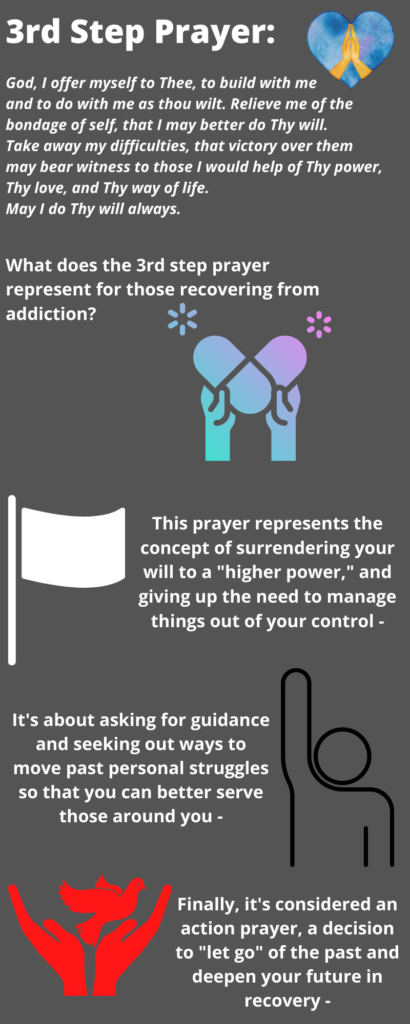What is the 3rd Step in the 12-Step Approach to Recovery?
Without a doubt, the most well-known and original 12-step support group is Alcoholics Anonymous (AA). In AA and other groups, like Narcotics Anonymous (NA), the focus is on “working” the 12-steps from start to finish. The 3rd step, in AA, is in the organization’s primary piece of literature, called the Big Book.

NA has a similar publication where it lists the steps, which are only slightly different.
Founded in the ’30s, 12-step organizations operate on the belief that addiction isn’t curable, but it is manageable. Members offer one another support at regular meetings where discussions range from celebrating long-term sobriety to recent relapses.
Newcomers are supposed to seek out a mentor, or a “sponsor,” to help them with the 12-step process. New members find their sponsors by attending meetings and listening to others’ experiences.
The 3rd step says, ” [We] made a decision to turn our will and our lives over to the care of God as we understand Him.”[1]
Is the Third Step Prayer About Religion?
The short answer is no. Yes, it reads like something out of the church. The 12-step recovery method is certainly a spiritual approach. However, it is not necessarily a religious one. Also, keep in mind it was written in the ’30s.
The religious style of language is jarring, especially to people who don’t believe in an omniscient creator. It may also be a turn-off to people who don’t subscribe to Christianity.
However, the key part to focus on in the 3rd step is “God as we understand Him.”
For some people, a “higher power” might be more of a religiously held belief. Others in recovery, though, have a concept of God that maybe something else altogether.
There is a popular acronym in AA that addresses this issue. The letters G-O-D stand for “group of drunks.” In other words, instead of the traditional understanding of God, it is the group that provides support and direction. The recovery community becomes “higher power.”
What is the 3rd Step Prayer?

The 3rd step is a prayer, which accompanies the 3rd step, is in most 12-step literature. A new member’s sponsor may or may not encourage them to learn it, depending on their style of mentoring.
The prayer reads as follows: “God, I offer myself to Thee, to build with me and to do with me as thou wilt. Relieve me of the bondage of self, that I may better do Thy will. Take away my difficulties, that victory over them may bear witness to those I would help of Thy power, Thy love, and Thy way of life. May I do Thy will always.”
If you can look through the language, there is a message that many recovering addicts feel is universal.
What’s the Meaning of the Third Step Prayer?
For recovering addicts, the third step means letting go of self-will that blocks them from being useful to others and their “higher power.” It’s a type of spiritual surrender, giving up the need to try to control things outside of themselves.
Attempting to manage problematic relationships or situations is unnecessary stress. For those new to recovery, this kind of behavior can lead to depression, anxiety, and even relapse. The third step prayer comes early in the 12-steps for good reason.

In addition, the prayer asks for guidance about their “higher power’s” will for them. So, if their “higher power” is the recovery community, they may look for ways to better serve the group.
Both surrendering self-will and serving the community helps people in 12-step support groups to deepen their recovery. Also, it allows them to be a positive role model for newcomers struggling with the first two steps.
Finally, the third step and its associated prayer are considered the first “action step” in the 12-step model. Both steps one and two calls for acceptance and reflection. The 3rd step pray has recovering addicts making the decision to abandon what’s beyond their control.
Is the 12-Step Approach to Recovery Right for Me?
This is a very personal question. It comes with a caveat. Most health care experts don’t consider 12-step groups a replacement for addiction treatment. Often, though, it is an excellent aftercare option for people working on their recovery.
Success rates for 12-step groups are difficult to track for a number of reasons. Likely the biggest reason, though, are many members want to remain anonymous and don’t participate in studies.
That said, one long-term study found that a combination of addiction treatment and AA improved sobriety outcomes in the one to three-year range.[2]
What’s most important is getting help if you need it. Addiction is treatable and countless people have recovered, repaired damaged relationships, and are living better lives now.
Sources
[1] “The Twelve Steps Illustrated” – Alcoholic Anonymous
[2] The Role of Mutual-Help Groups in Extending the Framework of Treatment – National Institute on Alcohol Abuse and Alcoholism
















